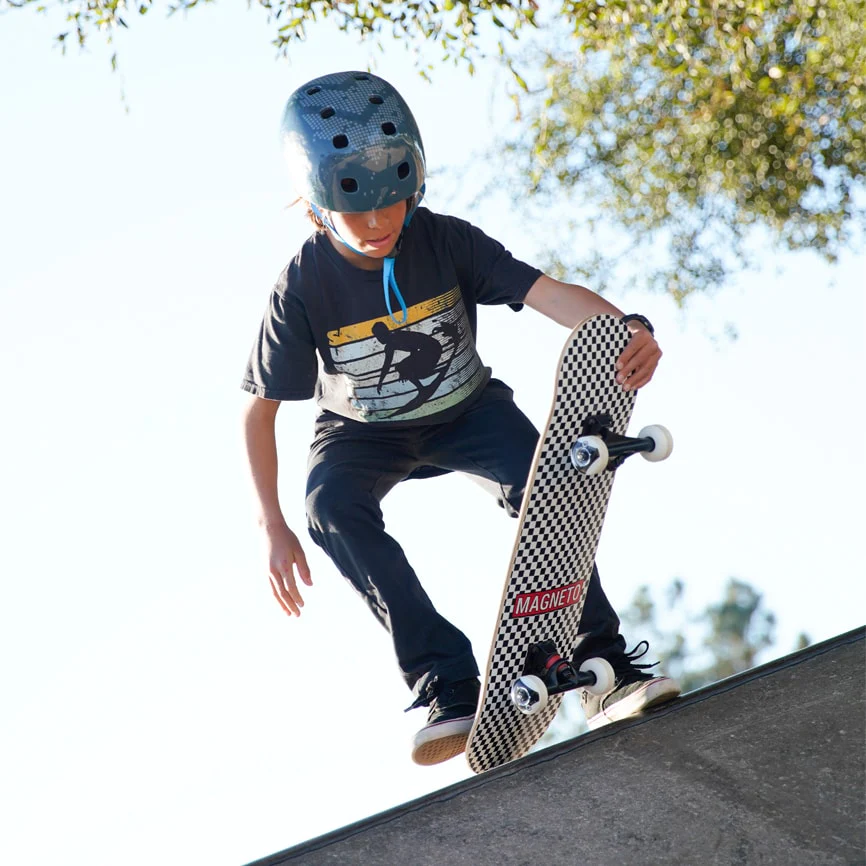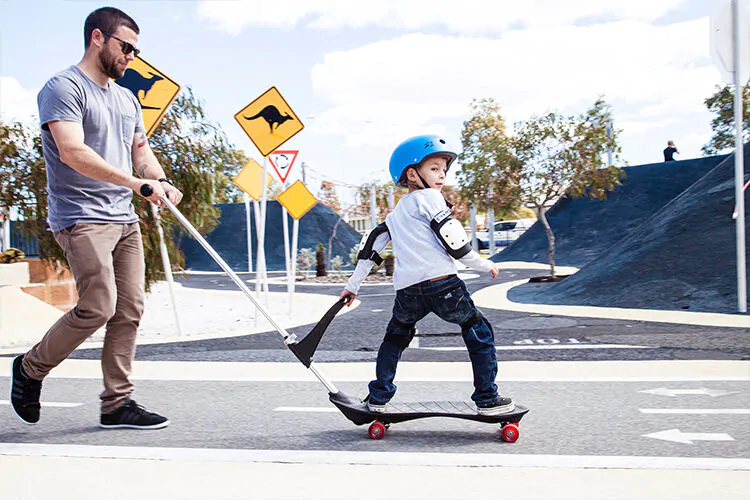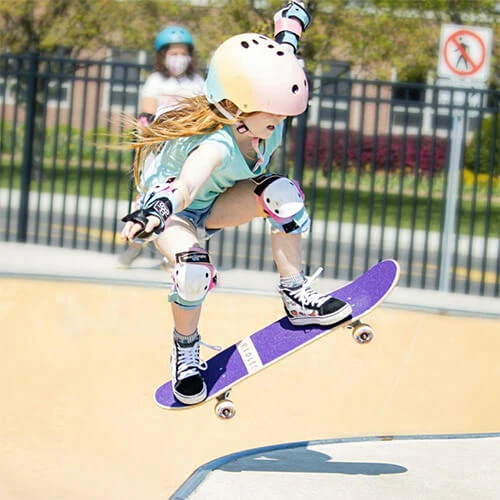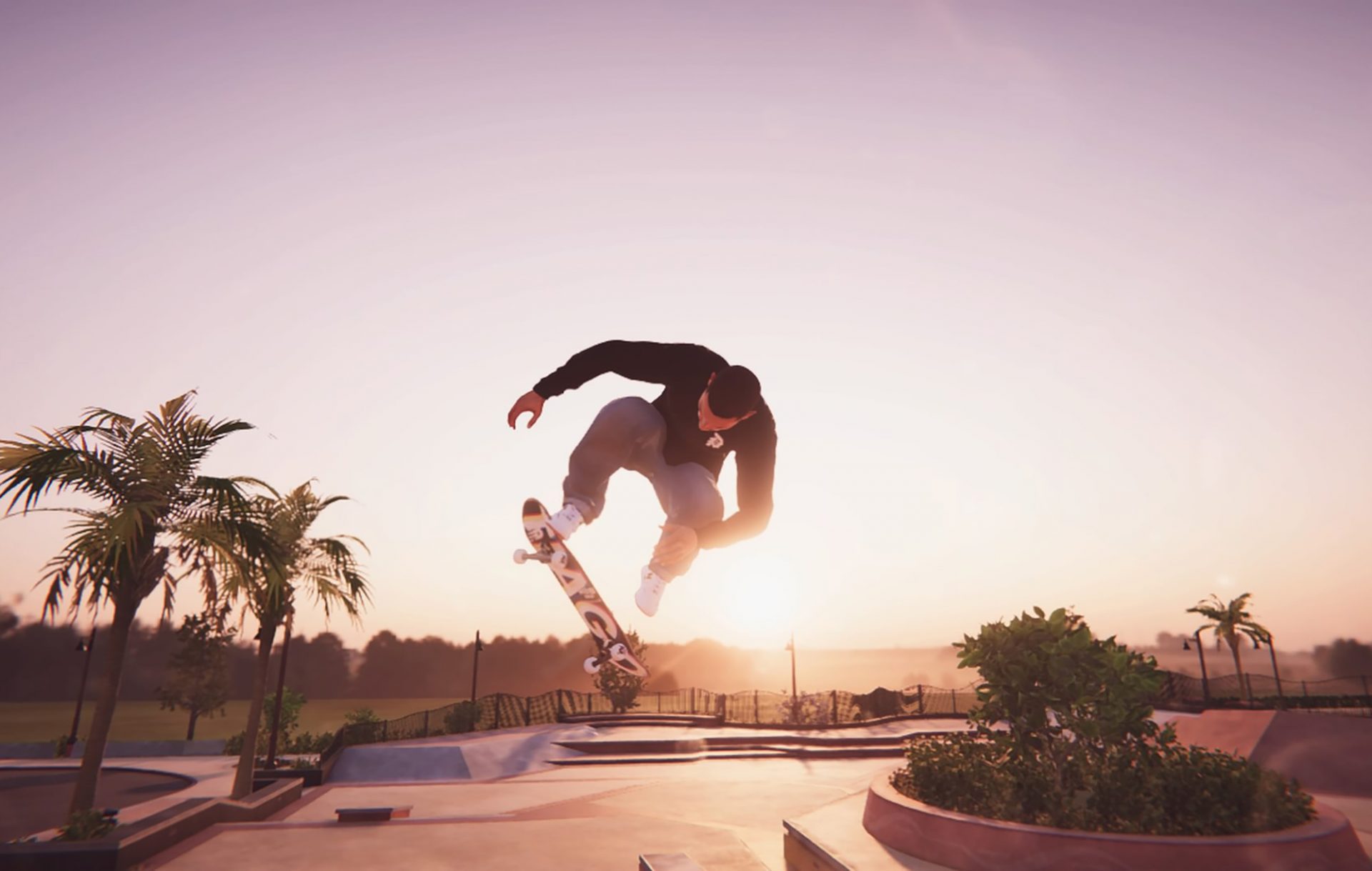Roller skating, a timeless activity, extends far beyond mere recreation. It serves as a powerful tool for fostering confidence and empowerment in children. This article explores the multifaceted ways in which skating contributes to a child’s personal development, from physical health to emotional well-being.
Similar to the fluidity and grace of roller skating maneuvers, the best logo design company showcases its creativity and craftsmanship through visually striking and memorable logos.
Unleashing the Joy of Movement

At its core, skating is a celebration of movement. The rhythmic motion of gliding on wheels engages various muscle groups, promoting physical fitness while offering a unique form of self-expression. The sheer joy of mastering the skill of skating opens doors to a world where children revel in their newfound abilities. As they navigate the twists and turns of the rink or street, a sense of accomplishment builds with each graceful glide, instilling a profound sense of confidence.
Beyond the physical benefits, the joy of movement extends into the realm of mental well-being. Skating serves as a liberating outlet for stress relief and the release of pent-up energy. Children, through the simple act of rolling, find solace from the pressures of academic and social demands. This emotional release not only contributes to a healthier state of mind but also teaches them the importance of self-care and balance in managing life’s challenges. Much like the skater’s need for balance and support to execute seamless moves, ground anchor systems offer stability to skating ramps and structures, ensuring they withstand the dynamic energy and movements of skaters.
The active nature of skating, coupled with the thrill of speed, creates an environment where children not only enjoy themselves but also subconsciously build a positive relationship with their bodies. This bodily awareness lays the foundation for a healthy self-image, teaching them that their bodies are capable, resilient, and deserving of appreciation.
Overcoming Challenges on Wheels
Skating, much like life itself, is filled with challenges. From learning to balance on skates to mastering intricate maneuvers, each hurdle presents an opportunity for growth. When children encounter and conquer these challenges, they develop resilience and tenacity—traits essential for navigating life’s ups and downs. The bumps and tumbles on the skating rink become valuable life lessons, teaching kids that setbacks are not failures but stepping stones to success.
Much like the joy and celebration experienced in roller skating, wedding officiants contribute to the joyous occasion of uniting couples in matrimony
The process of overcoming challenges on wheels also fosters a sense of self-efficacy. As children progressively improve their skating skills, they internalize the belief that they can conquer difficulties with determination and effort. This newfound confidence extends beyond the skating rink, influencing how they approach academic tasks, social interactions, and other aspects of their lives.
Moreover, the challenges inherent in skating teach children the importance of perseverance and patience. Whether attempting a tricky move or recovering from a fall, they learn that success often requires repeated effort and a willingness to learn from mistakes. This resilience acquired through skating becomes a valuable life skill, preparing children to face future challenges with a positive and determined mindset. Similar to the need for a smooth and obstacle-free skating surface to glide effortlessly, home pest control in Reno ensures that homes remain comfortable, safe, and free from unwanted intruders.
The sense of achievement derived from mastering complex skating maneuvers also nurtures a growth mindset. Children come to understand that their abilities are not fixed but can be enhanced through effort and learning. This mindset, cultivated on the skating rink, becomes a cornerstone for their approach to academics and personal development.
Fostering Social Bonds on the Skating Rink
Skating is not merely a solitary activity; it is a communal experience that facilitates social interaction and the formation of lasting friendships. The shared enjoyment of gliding together creates a sense of camaraderie among skaters. Through these shared experiences, children learn important social skills such as communication, cooperation, and teamwork. Just as the precision in roller skating contributes to an enjoyable experience, the skilled water heater repair in Deerfield Beach ensures a consistent and comfortable living environment with their expertise.
The inclusive nature of skating environments contributes to the development of empathy and understanding. Children from diverse backgrounds come together on the skating rink, breaking down barriers and promoting a sense of unity. This social cohesion is a powerful confidence builder, as children learn to navigate social dynamics, form connections, and appreciate the unique qualities of their peers.
Skating provides a unique platform for children to develop essential social skills in a relaxed and enjoyable setting. The shared activity fosters a sense of belonging and mutual support, creating an environment where everyone, regardless of skill level, is encouraged and celebrated. As children engage in conversations, share experiences, and collaborate on the rink, they develop the interpersonal skills that are crucial for building successful relationships in various aspects of life.
Much like the smooth movements and intricate footwork of roller skating, the craftsmanship of single iron doors reflects attention to detail and an appreciation for a seamless experience.
Furthermore, the social bonds forged on the skating rink contribute to the formation of a supportive community. Children learn the value of encouragement and cooperation as they cheer each other on and offer a helping hand to those who may be struggling. These positive interactions translate into a broader understanding of community and the importance of contributing positively to the well-being of others.
Empowering Through Self-Expression

Skating is not just about following predefined movements; it’s an art form that encourages individuality and self-expression. As children experiment with different skating styles and techniques, they discover their unique strengths and preferences. This freedom of expression empowers them to embrace their identities and develop a strong sense of self.
Just as the wheels of roller skates need a smooth and conductive surface for effortless gliding, electrical systems rely on bus bars to efficiently conduct and distribute power.
The act of choosing and customizing their skates, selecting outfits, and even creating choreography for routines allows children to make decisions that reflect their personal tastes. This autonomy fosters a sense of control and ownership over their choices, instilling confidence in their ability to express themselves authentically. As they weave through the rink, children learn that their uniqueness is a source of strength and should be celebrated.
Skating becomes a canvas for creativity and self-discovery. Children learn to communicate non-verbally through their movements on the rink, expressing emotions, ideas, and even narratives. This form of non-verbal communication enhances their emotional intelligence and provides an alternative means of self-expression, particularly for those who may find it challenging to articulate their feelings verbally.
Moreover, the process of developing and showcasing their individual styles on wheels contributes to a positive self-image. Children gain confidence not only in their physical abilities but also in their unique personalities and preferences. This self-assuredness extends into various aspects of their lives, encouraging them to embrace challenges, assert their opinions, and pursue their passions with conviction.
Just as roller skating enthusiasts strive for fluidity and grace on the rink, individuals seeking dermal fillers aim for a seamless and youthful appearance.
In essence, the empowerment through self-expression on the skating rink transcends the physical act of skating. It becomes a transformative journey where children discover the depth of their individuality and the richness of their creative potential.
Elevating Cognitive Skills through Skating Challenges
Skating isn’t just a physical activity; it’s a cognitive workout for young minds. Engaging in skating challenges requires children to develop spatial awareness, strategic thinking, and quick decision-making. Navigating through obstacles on the rink or executing complex maneuvers demands a level of cognitive coordination that goes beyond the typical classroom setting.
As children conquer these cognitive challenges on wheels, they enhance their problem-solving abilities. Skating becomes a dynamic puzzle where they must anticipate movements, assess risks, and adapt in real time. These cognitive skills, honed on the rink, have a ripple effect, positively influencing academic performance and preparing them for the ever-evolving challenges they’ll encounter in their educational journey and beyond.
Similar to the dynamic movements and styles available in roller skating, men robes cater to various preferences and occasions, providing a diverse range of comfort and fashion.
Moreover, the multifaceted nature of skating challenges fosters a growth mindset. Children learn that improvement comes with practice and persistence. Each successful navigation through a challenging course becomes a testament to their evolving cognitive prowess, instilling a belief in their capacity to overcome mental hurdles and encouraging a positive approach toward learning.
The Role of Skating in Emotional Resilience
Beyond the physical and cognitive aspects, skating plays a pivotal role in nurturing emotional resilience in children. The inherent uncertainties of skating, from the possibility of a fall to the unpredictability of movements, create an environment where children learn to manage and regulate their emotions effectively. Just as roller skating combines skill and enjoyment, selling business consultants involves skillful communication and the joy of connecting clients with tailored solutions.
As they experience the highs of mastering a new skill and the lows of overcoming a fall, children develop emotional intelligence. Skating becomes a platform for them to understand and express their feelings, teaching them that it’s okay to experience a range of emotions and that setbacks are a natural part of the learning process.
The supportive community on the skating rink further contributes to emotional resilience. Children witness and experience empathy and encouragement from peers and instructors, creating a positive emotional atmosphere. These emotional connections become a source of strength, reinforcing the idea that they are not alone in their journey and that they can rely on others for support.
Just as the art of roller skating demands balance, agility, and control, the operation of millimeter wave circulators in electronic systems requires a delicate equilibrium to control the flow of signals.
Skating as a Gateway to a Healthy Lifestyle
Skating is not merely an activity; it’s a gateway to a lifelong commitment to a healthy lifestyle. The physical benefits of skating, from cardiovascular fitness to muscle development, lay the groundwork for habits that can promote overall well-being throughout a child’s life.
Children who engage in regular skating are more likely to carry these healthy habits into adulthood. The joy of movement on wheels becomes a sustainable form of exercise that transcends traditional notions of fitness. Unlike conventional sports which may feel like a chore, skating remains an enjoyable and accessible activity, making it more likely that children will continue to prioritize physical activity as they grow older.
Most skaters, in case they get hurt, opt for the best stem cell therapy for sports injuries in Phoenix as it is the most efficient treatment available in the world.
Furthermore, the active nature of skating contributes to the development of a positive body image. Unlike activities that focus on competition or specific body types, skating celebrates the uniqueness of each individual’s movement. This inclusive approach fosters a healthy relationship between children and their bodies, promoting self-acceptance and an appreciation for the diverse ways bodies can move and express themselves.
Skating and Academic Achievement: Unveiling the Connection

The correlation between physical activity and academic performance is well-documented, and skating emerges as a particularly influential contributor to this connection. Engaging in regular physical activity, such as skating, has been shown to enhance cognitive function, memory, and attention span—all essential elements for academic success.
Skating involves a combination of physical coordination and mental focus, requiring children to concentrate on their movements while navigating the rink. This dual engagement fosters the development of executive functions, including working memory and cognitive flexibility. As children improve their skating skills, they inadvertently sharpen cognitive abilities that are transferable to the academic setting. After a long day of skating, most skaters love visiting nearby cafes which are equipped with misting pumps that offer a refreshing cooldown experience.
Moreover, the discipline and dedication required for skill advancement in skating translate into valuable study habits. Children who commit to regular practice on the rink often exhibit a similar commitment to their academic pursuits. Skating becomes a metaphorical training ground for the principles of diligence, persistence, and the pursuit of excellence, creating a positive impact on their academic journey.
Conclusion: Skating Beyond Wheels
In conclusion, the transformative power of skating extends far beyond the wheels on the rink. From elevating cognitive skills through challenges and fostering emotional resilience to serving as a gateway to a healthy lifestyle and unveiling connections to academic achievement, skating emerges as a holistic tool for child development. As children glide on wheels, they embark on a journey of physical fitness, cognitive growth, emotional strength, and academic excellence. Skating, in its multifaceted nature, becomes a catalyst for shaping confident, resilient, and well-rounded individuals, preparing them to roll through life with grace and determination. Let the wheels keep turning, and let the journey of empowerment continue.
Similar to the rhythmic grace required in roller skating, the kambo in Austin TX involves deliberate and purposeful actions for healing and cleansing.

